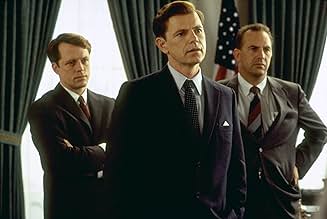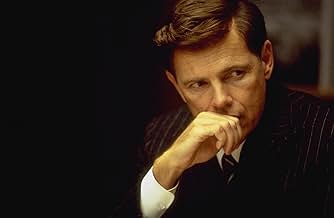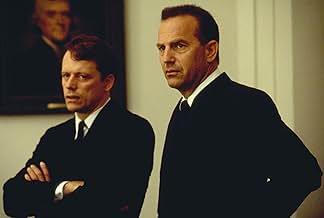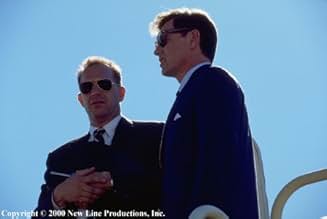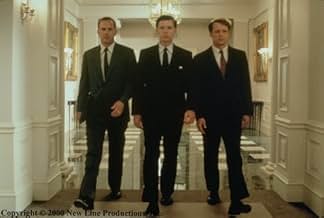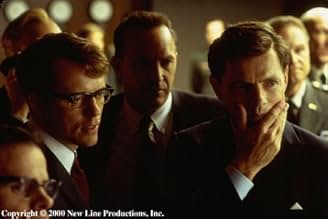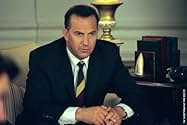En octubre de 1962, la administración Kennedy intenta contener la crisis de los misiles cubanos.En octubre de 1962, la administración Kennedy intenta contener la crisis de los misiles cubanos.En octubre de 1962, la administración Kennedy intenta contener la crisis de los misiles cubanos.
- Dirección
- Guionistas
- Elenco
- Premios
- 3 premios ganados y 8 nominaciones en total
- Dirección
- Guionistas
- Todo el elenco y el equipo
- Producción, taquilla y más en IMDbPro
Opiniones destacadas
In 1962, the world stood on the brink of World War III for "Thirteen Days," a 2000 film starring Kevin Costner, Bruce Greenwood, Steven Culp and Dylan Baker, with direction by Roger Donaldson. The story concerns the "Cuban Missile Crisis," when the U.S. discovered that the Soviets had placed missiles aimed at the U.S. in Cuba.
As someone who remembers the situation well, watching this was a profound experience in more ways than one. A good deal of dialogue was taken from actual Presidential transcripts, which made watching it even more impressive. Looking at it from today's eyes, "Thirteen Days" is a knockout.
Donaldson focuses the film right where it should be - in the White House and in conference rooms, giving us only the subplot of Kenny O'Donnell's family life. For those posters who commented that O'Donnell was perhaps not a real person, yes, he was. It's impossible for me to believe that with a film that goes into so much detail and strove to be so factual, someone thought there was a made-up character. Try Google next time. Ken O'Donnell headed up Kennedy's presidential campaign and was appointed his Special Assistant when Kennedy won the White House. He was the most powerful of the President's advisers.
Several things become clear about the goings-on at the White House in 1962: None of the military leaders thought the Kennedy administration belonged in the White House; if it had been up to the military leaders, the situation would have caused World War III; JFK turned himself into a pretzel in order to pursue a diplomatic solution to the potential conflict. Though discouraged almost at every turn, JFK still would not allow the shooting to begin, pushing instead for an embargo against Cuba.
There is plenty of tension and excitement in this film. One of the best scenes is Commander Eckerd (Christopher Lawford) and his team low-flying over Cuba taking photos, and a U-2 pilot trying to avoid missiles chasing him. But most of the tension and excitement takes place in the meetings as the President and RFK struggle for answers and play for time. The mix is therefore ideal: drama, some aerial excitement, and a little humor as Adlai Stevenson gets the better of the Russians in an OAS meeting.
There's also a look at the reaction of the country - also very accurate. Yes, people piled into church, cleared the grocery shelves of everything, and stocked fallout shelters. We all watched the President on television. In fact, as he talked, my mother thought he was about to declare war. It was a terrifying time.
Kenny O'Donnell's role in all of this may have been somewhat exaggerated to make it a palatable role for Kevin Costner. Costner does okay in the part. Boston accents are very difficult to do without them sounding put on. It's very difficult to do accents in general and make them organic to the character. A few have succeeded: Anne Bancroft in "The Miracle Worker," Paul Newman in "Somebody Up There Likes Me," little Natalie Wood in "Tomorrow is Forever," Travolta in "Saturday Night Fever," and of course there are others. Jane Seymour and Joan Collins can easily pull off being Americans. All British actors can do a southern accent, since the southern accent started off as a British accent. Costner lays it on too thick and it's a distraction. But he certainly isn't bad in the role.
The casting people merely wanted to suggest JFK and RFK. In Steven Culp, they found a young actor with similar features to RFK. He does an effective job, given that it's tough going to portray such a famous person. The most successful in the film is Bruce Greenwood as JFK, who tries to keep the accent from overpowering the dialogue. In the President's television speech, I'm sure he imitated JFK's every single inflection and pause, and it's perfect. His JFK is a listener, very dependent on his brother's advice, and one who takes the burdens of the country on his shoulders like a cross. One of the posters here mentioned something to the effect that "we are led to believe that JFK leaned heavily on his advisors" as if this is a negative. Of course he did. Of course any President does or should. The final decisions belonged to him, and he had to be sure of all of the ramifications. Only an idiot doesn't hear every single opinion of value before he decides to launch World War III.
The camaraderie between RFK, JFK, and O'Donnell is as unmistakable as their arguments and frustrations.
Thirteen months after the Cuban Missile Crisis, JFK would be dead and O'Donnell would be riding behind him in the Secret Service Car. After a particularly tough meeting with the Joint Chiefs of Staff, O'Donnell insists that JFK sit for a minute, and JFK finally does. Worn out and not sleeping well, he laments about being President. "I just thought there would be more good days." In the end, we - and he - would have settled for just MORE days.
As someone who remembers the situation well, watching this was a profound experience in more ways than one. A good deal of dialogue was taken from actual Presidential transcripts, which made watching it even more impressive. Looking at it from today's eyes, "Thirteen Days" is a knockout.
Donaldson focuses the film right where it should be - in the White House and in conference rooms, giving us only the subplot of Kenny O'Donnell's family life. For those posters who commented that O'Donnell was perhaps not a real person, yes, he was. It's impossible for me to believe that with a film that goes into so much detail and strove to be so factual, someone thought there was a made-up character. Try Google next time. Ken O'Donnell headed up Kennedy's presidential campaign and was appointed his Special Assistant when Kennedy won the White House. He was the most powerful of the President's advisers.
Several things become clear about the goings-on at the White House in 1962: None of the military leaders thought the Kennedy administration belonged in the White House; if it had been up to the military leaders, the situation would have caused World War III; JFK turned himself into a pretzel in order to pursue a diplomatic solution to the potential conflict. Though discouraged almost at every turn, JFK still would not allow the shooting to begin, pushing instead for an embargo against Cuba.
There is plenty of tension and excitement in this film. One of the best scenes is Commander Eckerd (Christopher Lawford) and his team low-flying over Cuba taking photos, and a U-2 pilot trying to avoid missiles chasing him. But most of the tension and excitement takes place in the meetings as the President and RFK struggle for answers and play for time. The mix is therefore ideal: drama, some aerial excitement, and a little humor as Adlai Stevenson gets the better of the Russians in an OAS meeting.
There's also a look at the reaction of the country - also very accurate. Yes, people piled into church, cleared the grocery shelves of everything, and stocked fallout shelters. We all watched the President on television. In fact, as he talked, my mother thought he was about to declare war. It was a terrifying time.
Kenny O'Donnell's role in all of this may have been somewhat exaggerated to make it a palatable role for Kevin Costner. Costner does okay in the part. Boston accents are very difficult to do without them sounding put on. It's very difficult to do accents in general and make them organic to the character. A few have succeeded: Anne Bancroft in "The Miracle Worker," Paul Newman in "Somebody Up There Likes Me," little Natalie Wood in "Tomorrow is Forever," Travolta in "Saturday Night Fever," and of course there are others. Jane Seymour and Joan Collins can easily pull off being Americans. All British actors can do a southern accent, since the southern accent started off as a British accent. Costner lays it on too thick and it's a distraction. But he certainly isn't bad in the role.
The casting people merely wanted to suggest JFK and RFK. In Steven Culp, they found a young actor with similar features to RFK. He does an effective job, given that it's tough going to portray such a famous person. The most successful in the film is Bruce Greenwood as JFK, who tries to keep the accent from overpowering the dialogue. In the President's television speech, I'm sure he imitated JFK's every single inflection and pause, and it's perfect. His JFK is a listener, very dependent on his brother's advice, and one who takes the burdens of the country on his shoulders like a cross. One of the posters here mentioned something to the effect that "we are led to believe that JFK leaned heavily on his advisors" as if this is a negative. Of course he did. Of course any President does or should. The final decisions belonged to him, and he had to be sure of all of the ramifications. Only an idiot doesn't hear every single opinion of value before he decides to launch World War III.
The camaraderie between RFK, JFK, and O'Donnell is as unmistakable as their arguments and frustrations.
Thirteen months after the Cuban Missile Crisis, JFK would be dead and O'Donnell would be riding behind him in the Secret Service Car. After a particularly tough meeting with the Joint Chiefs of Staff, O'Donnell insists that JFK sit for a minute, and JFK finally does. Worn out and not sleeping well, he laments about being President. "I just thought there would be more good days." In the end, we - and he - would have settled for just MORE days.
The fact of JFK's assassination, and especially the highly mysterious circumstances surrounding it, has resulted in a very distinct historical niche being carved around him. However, the majority of written examinations have concerned his assassination. The man's presidency, short though it was, was fraught with fascinating events and, both in literature and in film, they remain frustratingly under-examined. Which is why "Thirteen Days" is such a treat.
What the film essentially does is offer us a clearly partly-fictionalised but fairly true to the events account of the thirteen days of the Cuban Missile Crisis in 1962. It's a fascinating close-up on a fascinating man, who might have been a truly great president if he had gotten a proper chance. Of course, the filmic portrayal of JFK may be just a tad overly sympathetic, and the treatment of the military a tad overly harsh, and the importance of Kenny O'Donnell, played by Kevin Costner, is probably exaggerated, but these are minor quibbles. What this film really does is show us just how complicated and multi-faceted was the problem of Russian nuclear missiles being installed in Cuba. Not only did the president have to face the dim and distant threat of a faceless Russian bureaucracy, he had to deal with the multiple and conflicting options constantly being advanced to him, the dangers posed by certain special interests in military and intelligence and the popular opinion of the American people. The repercussions of any number of different courses of action were almost unthinkable. Tilting the hand seemingly in the American favour in one place, say in Cuba, would destabilise another danger zone, such as Berlin. Despite the fact that we all know how the events played out in the end, it can't be denied that this film keeps adding to the tension constantly, occasionally letting off a little and then piling on a whole lot more. It's a wonderful portrayal.
At its core, however, the film is an intelligent study of the ultimately paralysing effects of power, and the stark horror of mutual destruction as made possible by the harnessing of atomic power. The discovery of nuclear fission reactions has forever changed the face of warfare, because there now exists an ultimate solution so terrible it is almost beyond contemplation. In the comparatively safer times in which we now live, it is easy to forget how possible, perhaps even likely, the threat of nuclear war. America was then, and remains now, the most powerful nation on the planet, and yet a single wrong move could have ended all that, and at the cost of millions of innocent lives. Bearing the weight of decisions which could cost so much must have been a horrible burden to Kennedy, and, if nothing else, we should thank our lucky stars that he didn't buckle under the multifarious pressures placed on him. This film is a tribute to reason over hotheadedness, and peace over war. We should not forget the lessons that time has to impart, and if this represents a way to remember, then everyone ought to watch it.
What the film essentially does is offer us a clearly partly-fictionalised but fairly true to the events account of the thirteen days of the Cuban Missile Crisis in 1962. It's a fascinating close-up on a fascinating man, who might have been a truly great president if he had gotten a proper chance. Of course, the filmic portrayal of JFK may be just a tad overly sympathetic, and the treatment of the military a tad overly harsh, and the importance of Kenny O'Donnell, played by Kevin Costner, is probably exaggerated, but these are minor quibbles. What this film really does is show us just how complicated and multi-faceted was the problem of Russian nuclear missiles being installed in Cuba. Not only did the president have to face the dim and distant threat of a faceless Russian bureaucracy, he had to deal with the multiple and conflicting options constantly being advanced to him, the dangers posed by certain special interests in military and intelligence and the popular opinion of the American people. The repercussions of any number of different courses of action were almost unthinkable. Tilting the hand seemingly in the American favour in one place, say in Cuba, would destabilise another danger zone, such as Berlin. Despite the fact that we all know how the events played out in the end, it can't be denied that this film keeps adding to the tension constantly, occasionally letting off a little and then piling on a whole lot more. It's a wonderful portrayal.
At its core, however, the film is an intelligent study of the ultimately paralysing effects of power, and the stark horror of mutual destruction as made possible by the harnessing of atomic power. The discovery of nuclear fission reactions has forever changed the face of warfare, because there now exists an ultimate solution so terrible it is almost beyond contemplation. In the comparatively safer times in which we now live, it is easy to forget how possible, perhaps even likely, the threat of nuclear war. America was then, and remains now, the most powerful nation on the planet, and yet a single wrong move could have ended all that, and at the cost of millions of innocent lives. Bearing the weight of decisions which could cost so much must have been a horrible burden to Kennedy, and, if nothing else, we should thank our lucky stars that he didn't buckle under the multifarious pressures placed on him. This film is a tribute to reason over hotheadedness, and peace over war. We should not forget the lessons that time has to impart, and if this represents a way to remember, then everyone ought to watch it.
Poor Kevin Costner. I get the feeling that he just can't win no matter what he does. He gets slammed for being in films and not using an appropriate accent. Need we look any further than 'Robin Hood: Prince of Thieves'? When he does use an accurate accent, as he does in 'Thirteen Days,' he gets slammed for trying to elevate his game to a playing field dominated by more well liked method actors. I've heard an argument before that he should just stick to making westerns since, allegedly, they're the only films that he does well. Many would immediately argue that 'Wyatt Earp' cancels out 'Dances With Wolves.' I argue instead that people are just too hard on Kevin Costner and 'Thirteen Days' is a very good example of why he deserves a bit of a break.
'Thirteen Days' was the fastest two and a half hours that I've sat through in a long time. The film was absolutely engrossing and very tense. Everyone knows what happens (or should be able to infer it since we'd all be dead right now if things hadn't worked out so well) but the writing and direction deserve great credit. They were able to transfer the tension from the historical situation and bring it to the screen with electricity. I think it works brilliantly well for two main reasons: 1. The viewer may know what is going to happen, but the characters don't. They are stressed, terrified and at the breaking point. One wrong move and the whole world is obliterated. If that isn't good drama, I don't know what is. 2. The film makers very wisely resisted the impulse to try and show things from the Soviet point of view. The strength of the film is the peril of the situation and the terror of not knowing what the other guy is trying to do. By filming from solely an American perspective and keeping both the characters and audience in the dark, this character driven movie excels.
A second brilliant strategy employed by the film makers was in the casting. With the exception of Costner, there are no real stars. Instead there are more reliable, hard-working and chameleon-like character actors. Len Cariou, Dylan Baker, Stephen Culp, and Bruce Greenwood are just a small sampling. Greenwood plays JFK and excellently plays a man desperate for peace but surrounded by calls for swift military action. He sees the bigger picture where others don't, but may not be able to navigate the smaller picture without help. Dylan Baker is a doppelganger and his performance as McNamara is spot on.
Highly recommended.
'Thirteen Days' was the fastest two and a half hours that I've sat through in a long time. The film was absolutely engrossing and very tense. Everyone knows what happens (or should be able to infer it since we'd all be dead right now if things hadn't worked out so well) but the writing and direction deserve great credit. They were able to transfer the tension from the historical situation and bring it to the screen with electricity. I think it works brilliantly well for two main reasons: 1. The viewer may know what is going to happen, but the characters don't. They are stressed, terrified and at the breaking point. One wrong move and the whole world is obliterated. If that isn't good drama, I don't know what is. 2. The film makers very wisely resisted the impulse to try and show things from the Soviet point of view. The strength of the film is the peril of the situation and the terror of not knowing what the other guy is trying to do. By filming from solely an American perspective and keeping both the characters and audience in the dark, this character driven movie excels.
A second brilliant strategy employed by the film makers was in the casting. With the exception of Costner, there are no real stars. Instead there are more reliable, hard-working and chameleon-like character actors. Len Cariou, Dylan Baker, Stephen Culp, and Bruce Greenwood are just a small sampling. Greenwood plays JFK and excellently plays a man desperate for peace but surrounded by calls for swift military action. He sees the bigger picture where others don't, but may not be able to navigate the smaller picture without help. Dylan Baker is a doppelganger and his performance as McNamara is spot on.
Highly recommended.
Basically this movie is a great history lesson. If you want to know more about the cold war and the Cuba missile crisis in particular this is a perfect medium for you to start with. The movie is quite detailed and accurate even though of course some moments and characters have been 'over-dramatized' for the good of the movie and its flow and emotions.
Even though you already know from start till finish how this movie is going to end, it still is a tense movie to watch. The story is build up well and makes the movie really interesting and compelling to follow. It perfectly captures the tension of the whole crisis and really makes you realize how close the world actually came to a WW III. It makes us aware of the fact that those 13 days in history should always be remembered and used as a lesson for the entire world now and forever. It's too bad that the movie becomes a bit too moralistic at times, especially toward the ending.
Bruce Greenwood doesn't really look like JFK but he's a good actor, so he becomes believable enough in his role trough his acting skills. Steven Culp really does look like Robert Kennedy and on top of that he also is a great actor. I wasn't always happy with Kevin Costner performance but overall he did an acceptable job. There are some weaker moments which involves his character but I more blame those moments to the at times too moralistic written script.
A bit of a disappointing aspect of the whole movie is its style. Roger Donaldson at times tries to be over-artistic and mixes the movie with black & white and color images. Perhaps he tried to copy Oliver Stone's style? Who knows. The cinematography was also disappointingly standard but thankfully the good editing saved this a little. Also the musical score by Trevor Jones is surprisingly solid.
Overall it's a very good political movie that has some great tense and important moments in it and also works great as a history lesson.
8/10
http://bobafett1138.blogspot.com/
Even though you already know from start till finish how this movie is going to end, it still is a tense movie to watch. The story is build up well and makes the movie really interesting and compelling to follow. It perfectly captures the tension of the whole crisis and really makes you realize how close the world actually came to a WW III. It makes us aware of the fact that those 13 days in history should always be remembered and used as a lesson for the entire world now and forever. It's too bad that the movie becomes a bit too moralistic at times, especially toward the ending.
Bruce Greenwood doesn't really look like JFK but he's a good actor, so he becomes believable enough in his role trough his acting skills. Steven Culp really does look like Robert Kennedy and on top of that he also is a great actor. I wasn't always happy with Kevin Costner performance but overall he did an acceptable job. There are some weaker moments which involves his character but I more blame those moments to the at times too moralistic written script.
A bit of a disappointing aspect of the whole movie is its style. Roger Donaldson at times tries to be over-artistic and mixes the movie with black & white and color images. Perhaps he tried to copy Oliver Stone's style? Who knows. The cinematography was also disappointingly standard but thankfully the good editing saved this a little. Also the musical score by Trevor Jones is surprisingly solid.
Overall it's a very good political movie that has some great tense and important moments in it and also works great as a history lesson.
8/10
http://bobafett1138.blogspot.com/
I served aboard the USS Joseph P. Kennedy which was depicted in the film. The Kennedy was the ship that boarded the Marcula in the waters off the Bahamas. The Kennedy, now part of Battleship cove in Fall River, Ma., actually played herself in the film. The actual boarding was not as quite dramatic as depicted in the movie.
The boarding party for instance did not wear dress white uniforms and the Marcula was more of a "rust bucket" than depicted in the movie. Although the 5 inch guns were aimed at the vessel, I don't recall a shot being fired.
As far as the movie is concerned I though it gave a rather accurate accounting of the circumstances that surrounded this time in history with a few embellishment's that are purely thrown in as theatrical license.
The boarding party for instance did not wear dress white uniforms and the Marcula was more of a "rust bucket" than depicted in the movie. Although the 5 inch guns were aimed at the vessel, I don't recall a shot being fired.
As far as the movie is concerned I though it gave a rather accurate accounting of the circumstances that surrounded this time in history with a few embellishment's that are purely thrown in as theatrical license.
¿Sabías que…?
- TriviaPresident John F. Kennedy very frequently set up recording machines during meetings at the White House. Much of the dialogue from the movie is taken directly from Kennedy's tapes.
- ErroresPresident Kennedy wanted an eyewitness account so badly that Commander Ecker was ordered to the Pentagon to brief the Joint Chiefs of Staff immediately after landing his RF-8A Crusader, sweaty flight suit and all. This is often thought to be a glaring error in the movie, but his attire is absolutely accurate. Cdr. Ecker was not even allowed to exit his Crusader when he landed at NAS Cecil Field, Jacksonville FL. His film canisters were unloaded from his aircraft, he was refueled and sent immediately to Washington D.C., landing at Andrews AFB and whisked by limousine directly to the Pentagon where he met with the Joint Chiefs of Staff, apologizing right away for appearing at the briefing in his sweat-soaked flight suit. Cdr. Ecker, parched from the Cuba overflight and then the flight north to Washington, asked in a hoarse voice for a drink of water when he arrived. He refuses it in the movie.
- Citas
Kenny O'Donnell: If the sun comes up tomorrow, it is only because of men of good will. And that's - that's all there is between us and the devil.
- ConexionesEdited from Trinity and Beyond: The Atomic Bomb Movie (1995)
Selecciones populares
Inicia sesión para calificar y agrega a la lista de videos para obtener recomendaciones personalizadas
Detalles
- Fecha de lanzamiento
- País de origen
- Idiomas
- También se conoce como
- Thirteen Days
- Locaciones de filmación
- Productoras
- Ver más créditos de la compañía en IMDbPro
Taquilla
- Presupuesto
- USD 80,000,000 (estimado)
- Total en EE. UU. y Canadá
- USD 34,592,089
- Fin de semana de estreno en EE. UU. y Canadá
- USD 46,668
- 25 dic 2000
- Total a nivel mundial
- USD 66,579,890
- Tiempo de ejecución
- 2h 25min(145 min)
- Color
- Mezcla de sonido
- Relación de aspecto
- 1.85 : 1
Contribuir a esta página
Sugiere una edición o agrega el contenido que falta







